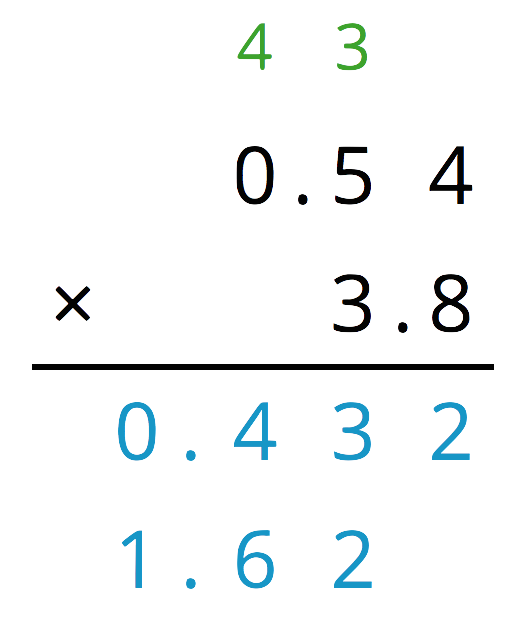Lesson 8
Calculating Products of Decimals
Problem 1
Here are an unfinished calculation of \((0.54) \boldcdot (3.8)\) and a 0.54-by-3.8 rectangle.


- Which part of the rectangle has an area of 0.432? Which part of the rectangle has an area of 1.62? Show your reasoning.
- What is \((0.54) \boldcdot (3.8)\)?
Solution
For access, consult one of our IM Certified Partners.
Problem 2
Explain how the product of 3 and 65 could be used to find \((0.03) \boldcdot (0.65)\).
Solution
For access, consult one of our IM Certified Partners.
Problem 3
Use vertical calculation to find each product.
- \((5.4)\boldcdot (2.4)\)
- \((1.67)\boldcdot (3.5)\)
Solution
For access, consult one of our IM Certified Partners.
Problem 4
A pound of blueberries costs $3.98 and a pound of clementines costs $2.49. What is the combined cost of 0.6 pound of blueberries and 1.8 pounds of clementines? Round your answer to the nearest cent.
Solution
For access, consult one of our IM Certified Partners.
Problem 5
Complete the calculations so that each shows the correct sum or difference.

Solution
For access, consult one of our IM Certified Partners.
(From Unit 5, Lesson 3.)Problem 6
Which has a greater value: \(7.4 - 0.0022\) or \(7.39-0.0012\)? Show your reasoning.
Solution
For access, consult one of our IM Certified Partners.
(From Unit 5, Lesson 4.)Problem 7
Andre is planting saplings (baby trees). It takes him 30 minutes to plant 3 saplings. If each sapling takes the same amount of time to plant, how long will it take Andre to plant 14 saplings? If you get stuck, consider using the table.
| number of saplings | time in minutes |
|---|---|
| 3 | 30 |
| 1 | |
| 14 |
Solution
For access, consult one of our IM Certified Partners.
(From Unit 2, Lesson 12.)